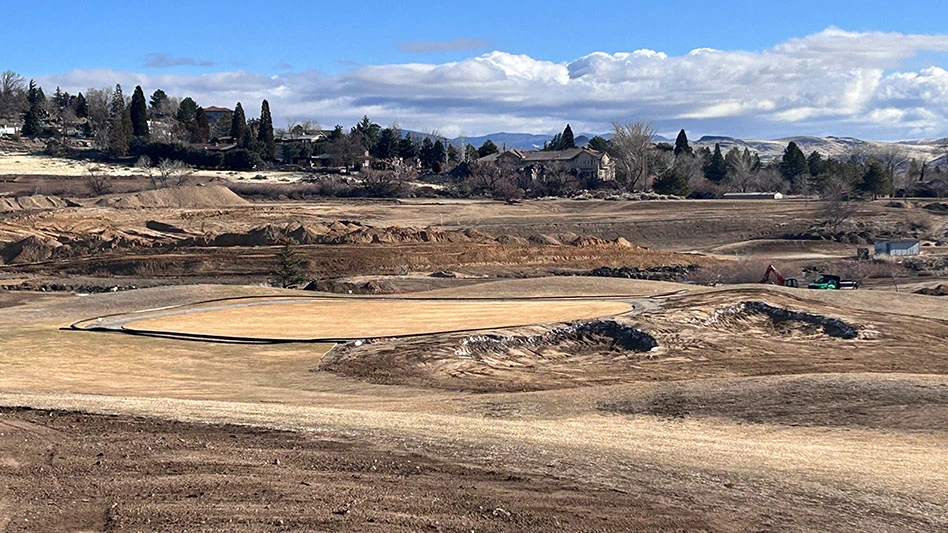A big part of my weird job is to keep tabs on what’s going on in the wide world of golf, and, not surprisingly, the World Wide Web is an enormous resource for me. Every morning, I get up at O-Dark-Thirty, fix a pot of coffee, fire up a Marlboro and begin surfing to find a bunch of golf-related Web sites to catch up on news and opinions of the day.
One of the Web sites I visit regularly is GolfClubAtlas.com. It’s an interesting discussion group that’s largely populated by serious golf junkies who compare notes on great courses throughout the world. Although I respect the views of many GCA members when it comes to design and playability, I’m often bemused by the crap these folks post regarding turf species, mowing heights, green speed and other conditioning topics.
For example, most posters are big on “fast-and-firm” conditions without really understanding how they’re achieved. I occasionally jump into the electronic debate to try to insert a note of agronomic or business reality, but they often don’t want to hear it. They have their opinions and won’t be swayed. It reminds me of the old-time reporter’s axiom: Don’t let the facts get in the way of a good story. Except in this case it’s, “Don’t let facts about turf health get in the way of my golf game.”
But, despite its faults (or perhaps because of them), visiting the GCA discussion group is a great way for superintendents and owners to understand what the average low-handicapper, semicrazed golfhead is thinking. It’s like a focus group populated with the guys who tend to be the loudest, most insistent, insufferable members or players on your golf or green committees.
Recently, there was a discussion thread about the best superintendent’s job in the nation. Predictably, from their somewhat warped perspectives, the focus was on famous old courses designed by one of the dead Scottish guys. Classics like Yale University Golf Course in New Haven, Conn., Augusta (Ga.) National and Cypress Point Club in Pebble Beach, Calif., were cited.
No doubt those are great jobs. But, it occurred to me that hundreds, if not thousands of superintendents believe they have the best job in the business based on their own individual criteria.
So, what are the reasons a particular superintendent wants to stand on the 18th green and shout, “I love my job!” Here are a few possibilities, and some observations, about each:
Prestige. Want to be at a Top 100 club? Host a big televised event? The good news is you’re the man. The bad news is … you’re the man. Prestige usually equals pressure to perform and sometimes ridiculous expectations. It also means dealing with the Tour, the USGA, a bunch of consultants and the boneheads from network TV. Ready for that?
Money. I’m making a wild guess, but I’ll bet only around 2 percent of all head superintendent jobs garner more than $150,000 a year. That’s about 350 or so jobs out of 16,000-plus facilities. Let’s be honest. About one-third of those jobs belong to guys who worked for Paul Latshaw earlier in their careers.
Another third are guys who caught the eye of Bruce Williams, the industry’s preeminent placement guy. The final third are people who worked their butts off, made good contacts and found themselves in the right place at the right time. Which route will you take? And, if you lose that job, how long will it take you to find another one in the same pay grade?
Outside opportunity. You might be thrilled to find yourself at a low-impact course that allows you to do other things. Maybe you want to consult, buy or manage a couple of other courses, or even run a little landscaping business on the side. With the right ownership, a good assistant and a creative approach, you could be in heaven. Then again, if you neglect your primary job or your world-class assistant moves on, you could be on the unemployment line.
Inside opportunity. As a kid, you loved to play in the dirt with your Tonka trucks. Now, your sandbox is a 150-acre golf course that’s doing big construction jobs. Score! The facility has a couple of million dollars to spend on bunkers, greens reconstruction or irrigation, and you get to ride shotgun during the entire process. Pretty cool, but it can be perilous if things aren’t done just right. You have to be confident enough to know what you can handle, but savvy enough to know when to turn things over to the right architect, builder or irrigation consultant. Also, beware of catching “construction fever” and wandering the world for the next 20 years riding a D-6 Cat bulldozer and being a site gypsy.
Owner relationship. We probably all know one or maybe two superintendents who managed to hook up with a special owner (or one of those rare club presidents for life) with whom they miraculously agree on everything and who stay at the same facility for 30, 40 or 50 years. Think that happens often?
During my 20 years in the industry, I can count the number of individuals who’ve lucked their way into one of these deals on 10 fingers and maybe a couple of toes. These happy accidents occur once in a blue moon. Always be on the lookout for one, but don’t bet the farm on it. Also, remember that if your golden goose dies, the golden eggs stop too.
Stress level. So you’ve found a job that comes complete with an “assistant for life” who knows everything there is to know but doesn’t want your title. Or, you’ve stumbled into one of those rare positions in which everyone that matters at the facility respects what you do and likes you. Your stress meter is pegged at zero most days. You could end up being one of those lucky fingers-and-toes guys I mentioned earlier for decades to come if you play your cards right. Just remember low stress doesn’t mean low expectations and things can change in a heartbeat because of bad weather, bad luck, a change in ownership/management or a bad hire. One warning: As secure as things might be, beware the new general manager.
Other stuff. How about a chance at a sweat equity ownership share in the course? That could be a dream for someone who doesn’t just want to collect a paycheck for life. Or, you find a job that allows you to stay close to family or friends. Maybe that’s the deciding factor. Last, but not least, you’re simply having a ball because of a combination of factors. When you wake up every morning knowing that your job is actually fun, your biggest problem is all the speeding tickets you get racing to work.
So, who really does have the best job in the business? I bet hundreds, if not thousands, of you reading this right now are saying, “I do!” But, seriously, the best job in the business … sorry, I already have it. GCN

Explore the October 2006 Issue
Check out more from this issue and find your next story to read.
Latest from Golf Course Industry
- The Cabot Collection announces move into course management
- Carolinas GCSA raises nearly $300,000 for research
- Advanced Turf Solutions’ Scott Lund expands role
- South Carolina’s Tidewater Golf Club completes renovation project
- SePRO to host webinar on plant growth regulators
- Turfco introduces riding applicator
- From the publisher’s pen: The golf guilt trip
- Bob Farren lands Carolinas GCSA highest honor







